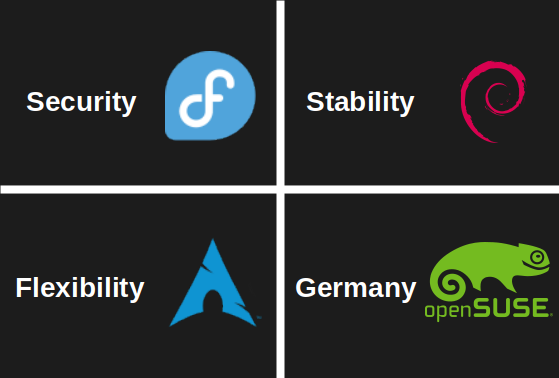ITT - "I DISAGREE WITH THE FACTUAL ACCURACY OF THE SETUP AND/OR PUNCHLINE OF YOUR JOKE."
linuxmemes
Hint: :q!
Sister communities:
Community rules (click to expand)
1. Follow the site-wide rules
- Instance-wide TOS: https://legal.lemmy.world/tos/
- Lemmy code of conduct: https://join-lemmy.org/docs/code_of_conduct.html
2. Be civil
- Understand the difference between a joke and an insult.
- Do not harrass or attack members of the community for any reason.
- Leave remarks of "peasantry" to the PCMR community. If you dislike an OS/service/application, attack the thing you dislike, not the individuals who use it. Some people may not have a choice.
- Bigotry will not be tolerated.
- These rules are somewhat loosened when the subject is a public figure. Still, do not attack their person or incite harrassment.
3. Post Linux-related content
- Including Unix and BSD.
- Non-Linux content is acceptable as long as it makes a reference to Linux. For example, the poorly made mockery of
sudoin Windows. - No porn. Even if you watch it on a Linux machine.
4. No recent reposts
- Everybody uses Arch btw, can't quit Vim, and wants to interject for a moment. You can stop now.
Please report posts and comments that break these rules!
Important: never execute code or follow advice that you don't understand or can't verify, especially here. The word of the day is credibility. This is a meme community -- even the most helpful comments might just be shitposts that can damage your system. Be aware, be smart, don't fork-bomb your computer.
I'll never stop hating that debian is labeled stable. I'm fully aware that they are using the definition of stable that simply means not updating constantly but the problem is that people conflate that with stability as in unbreaking. Except it's the exact opposite in my experience, I've had apt absolutely obliterate debian systems way too often. Vs pacman on arxh seems to be exceptionally good at avoiding that. Sure the updated package itself could potentially have a bug or cause a problem but I can't think of any instance where the actual process of updating itself is what eviscerated the system like with apt and dpkg.
And even in the event of an update going catastrophically wrong to the point that the system is inoperable I can simply chroot in use a statically built binary pacman and in a oneliner command reinstall ALL native packages in one go which I've never had not fix a borked system from interrupted update or needing a rollback
Good point! But I recently swapped to Debian 12 from Fedora 41. The latter needing constant updates several times a day. And despite this, it was not stable at all.
From my experience of Fedora: would you like to update today? Debian: You're good bro, no updates today.
I think I've put fedora on at least 4 personal systems and it has never caused an issue. It's so smooth it's boring in the best way. Switched to it for daily computing about 4 years ago. I use a minipc as a media server with Arch and turning it on it's exciting. Just this fucking morning the default configuration decided that my main audio device was a microphone. Lovely. So flexible.
I think, a more serious attempt to summarize openSUSE would probably be: Functionality
Debian, Arch, Fedora and such are all weirdly similar in that they focus so much on minimalism. For example, Debian uses dash as the default shell, which breaks TTYs, but possibly squeezes out a tiny bit of performance, so I guess, that's worth it...?
More accurate i would describe Fedora is:
Adopting Modern features first(Wayland,pipewire,etc Like there is no x mode in most stable Wayland desktops) and only having free and open source Repos(Rpmfusion can be added but its not official and excludes the Kernel drivers).
for security, use Tails, Qubes, Whonix, or if you want gaming + security, then Bazzite or Garuda
You're confusing security with privacy. While distros you mentioned are great for preventing ISPs and governments from spying on you (privacy), they're not really any better at preventing hackers from exploiting your vulnerable web server than fedora (security).
no, Qubes, Bazzite, Garuda were made with security in mind. Containerization, selinux enforcing, hash checks, address space layout randomization is also built in. These are all more secure than Fedora. Qubes for example, uses vm containers to completly isolate every app, so the system is almost impossible to compromise by malware or hacking. Bazzite uses immutable root file system, much like stock android. it may not along well with unix philosophies, but there isn't really a way for a malicious code to run with elevated privilages or to manipulate system files. Garuda automatically creates snapshota from the system, so if it is compromised, it can be rolled back quickly. Snapshots for external devices or cloud are supported as well. It uses zram compression on swap, this helps avoid data leakages to the disk, so makes sure that after a reboot, every session quits, since data from ram can't leak on the disk. it also uses firejail and chaotic aur sandboxing. There is a smaller support for secure boot too. So these are all highly secure operating systems. And to some degree, privacy and security overlap each other.
